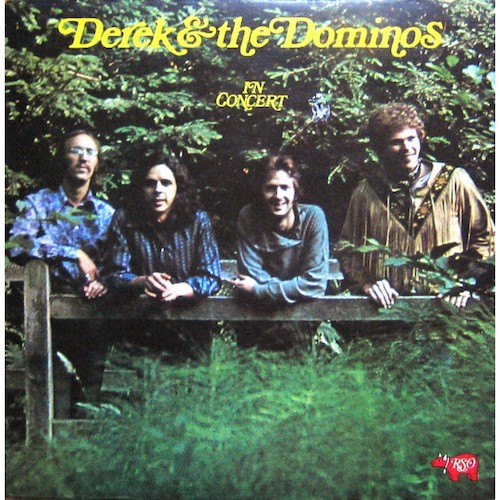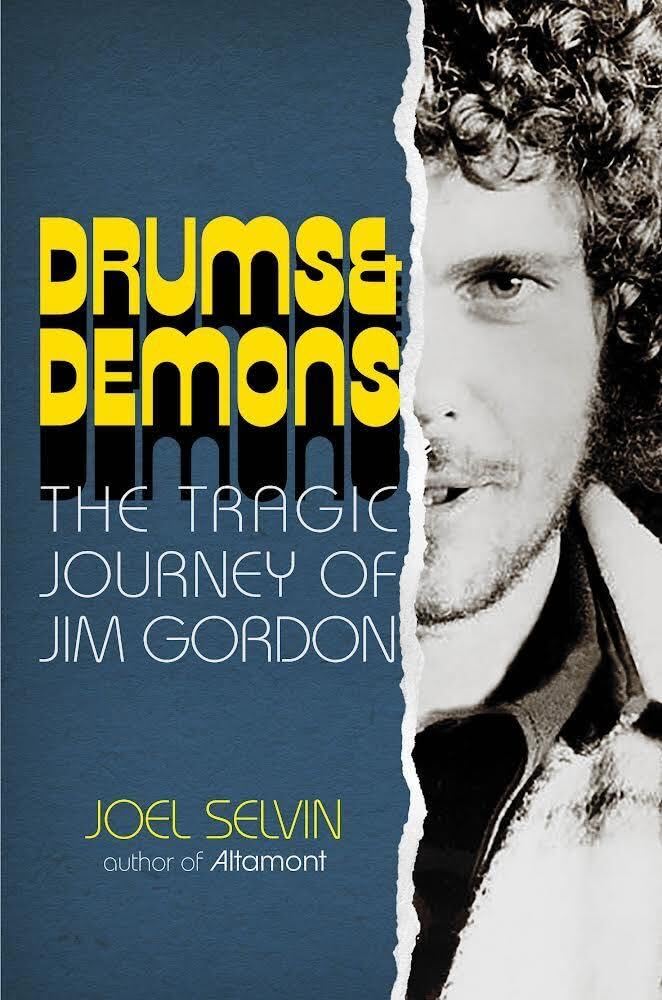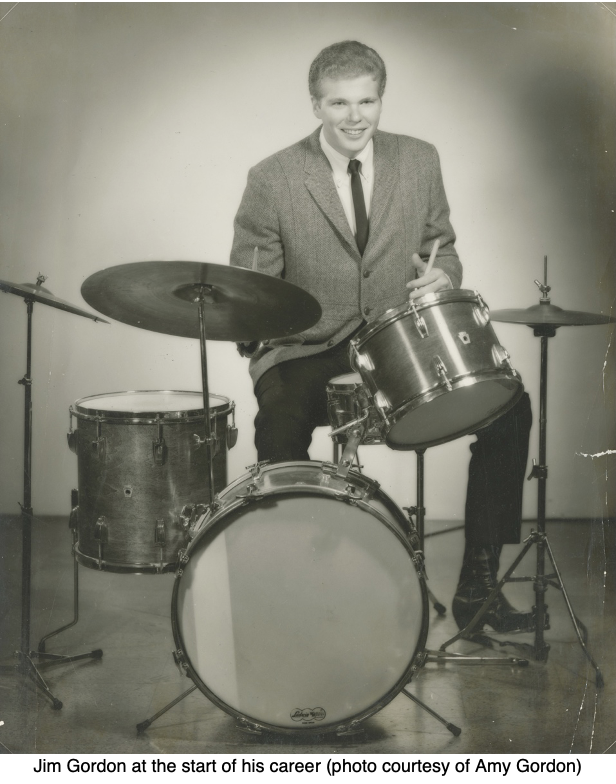The Tragedy of Drummer & Murderer Jim Gordon: 10 Questions for Biographer Joel Selvin
by Jeff TamarkinUntil June 3, 1983, most people knew Jim Gordon—if they knew his name at all—as one of the most transcendent, and prolific, behind-the-scenes drummers in the music business. Beginning in the ’60s, he was a first-call session man and occasional live performer who contributed to the music of a wide variety of artists, ranging from the Beach Boys (he played on Pet Sounds) to Frank Zappa and solo recordings by three Beatles (all except Paul).
He was, notably, the drummer in Eric Clapton’s heralded early ’70s band Derek and the Dominos and played on their Layla and Other Assorted Love Songs album. Gordon also helped out the likes of Joe Cocker, Johnny Rivers, Leon Russell, Tom Waits, Traffic, John Lee Hooker, Harry Nilsson, Steely Dan, Jackson Browne, Carly Simon, Gordon Lightfoot and literally thousands more.
Gordon, however, was schizophrenic, and his mental illness finally got the best of him on that horrific day in 1983 when he attacked his mother with a hammer and then fatally stabbed her. Gordon spent the rest of his life in prison, repeatedly denied parole. Musicians who once championed his talent avoided him, never mentioning him again, while fans who once raved about his superb technique and intuitive feel revised their descriptions of him: The term “killer drummer” took on a whole new meaning in regards to Jim Gordon.

Derek & the Dominos (L-R: Carl Radle, Bobby Whitlock, Eric Clapton and Jim Gordon)
Veteran music journalist and author Joel Selvin, in his new biography, Drums & Demons: The Tragic Journey of Jim Gordon [published on Feb. 27, 2024 and available in the U.S. here and March 14 in the U.K. here], takes a measured approach to the story of Gordon, who died in 2023 at age 77. Balancing Gordon’s immense musical contributions with the harrowing details of the murder, and emphasizing the role that Gordon’s illness played in his shocking story, Selvin avoids sensationalism and digs deep into the background of the man, who mostly shied away from the spotlight during his career until that no longer became possible.
In the following Q&A, Best Classic Bands discussed the Jim Gordon book with Selvin, whose previous book subjects have ranged from the Twist dance craze to the Altamont festival, songwriter Bert Berns and the Grateful Dead’s post-Garcia career. In 2023, the Arhoolie Foundation published the book Down Home Music: The Stories and Photographs of Chris Strachwitz, by Selvin with Strachwitz, the founder of Arhoolie Records.
Listen to Steely Dan’s “Rikki Don’t Lose That Number,” featuring Gordon on drums
Best Classic Bands: Jim Gordon’s story was already rock lore before the arrival of your bio. Why did you want to investigate it further?
Joel Selvin: I have had the Jim Gordon story spinning in my brain since it happened. It was an editor at a publishing house that suggested my next book combine rock and roll and crime. I remembered a couple of people who had Jim’s cooperation on a book they could never finish back in the late ’80s and when I was able to acquire their research, I knew I had a book.
Would there have been a need for a Jim Gordon book, or a market for one, had his crime never occurred?
His career as a sideman is certainly auspicious but probably not enough for a book-length treatment. My book is more about mental illness than music.
Was it difficult to sell a book to a publisher on a drummer-turned-murderer?
Yes. Several houses sat on the proposal for weeks, debating the acquisition and ultimately deciding against it.
Were his colleagues, friends, family, etc., cooperative?
Some were, but some were not. There was more pushback than I have ever encountered before. The matricide thing still lingered all these years later, but when he died, that all disappeared in a moment. He went from being someone who brutally killed his mother to a hopeless victim of mental illness.
You treat his crime matter-of-factly, but it shocked those of us who didn’t know him personally. Was there anything that could have been done to prevent it?
His mother notified the police, but they didn’t do anything, not that they could have. Jim’s symptoms were so severe, it would appear he had as extreme a case as there is. Only half the schizophrenics diagnosed can be helped through treatment and Jim was at the far end of the spectrum.
Did he understand what he did and why it was wrong?
Jim was mentally ill. He did not live in the same reality as you and I do. He was still mad at his mother and still heard voices. Going to prison did not cure him.
Moving along to the music, how would you describe his playing style and why, in your opinion, did those who hired him most want to work with Jim Gordon?
Jim’s playing always had a luminous quality all his own. There was never anything staid or cliched. He drove the drums into the fabric of the musical composition. The level of intuition involved is incalculable and probably tied to the same biochemical system that made him ill. Drummers all recognize his work instantly. What he did went beyond notation.
Related: Our 2023 obituary of Gordon
What is the quintessential Jim Gordon recording and what makes it so?
Hard to pick one—he was as important to Merle Haggard records as he was Gary Puckett—but I think [Carly Simon’s] “You’re So Vain” stands out as a masterpiece of drumming.
What was the most surprising thing about Gordon that you learned from your research?
How common schizophrenia is—it exists in one in 100 in the population (multiple sclerosis is one in 10,000). Jim, of course, was not properly diagnosed until after the murder. He was too high-functioning. Psychiatrists all thought he suffered from depression or maybe a mood disorder.
Will it ever be possible to consider Gordon on his musical merits alone, or will he always be referred to as the drummer/mother killer?
Perhaps the book can restore some of Jim’s accomplishments and earn him some of the compassion he never received during his lifetime. The murder buried him. He really was something very special and his contributions are enormous, but the ghastly murder will forever stain his reputation. But, as Frank Zappa said in the book, “If this is about chemicals in the brain, it could happen to anyone.”
[Drums & Demons: The Tragic Journey of Jim Gordon is available to order in the U.S. here and in the U.K. here.]
Watch Derek and the Dominos perform “It’s Too Late” live on The Johnny Cash TV Show in 1971









5 Comments so far
Jump into a conversationI’ll have this book in my hands by the weekend….
Though Gordon is also known for writing the piano coda to “Layla,” Rita Coolidge tells a convincing alternate story in her 2016 autobiography. According to Coolidge, Gordon came to her early in 1970 with a progression. She claims to have added a countermelody, and when touring with Delaney and Bonnie they played Eric Clapton their collaboration called “Time (Don’t Let the World Get in Our Way).” They got him a demo cassette, and she says that’s the last she heard of it until early the next year when she was taking photographs for her debut album… and literally heard that familiar tune. At the beginning of her career she says she felt powerless to take on the powerful; in time she found solace in some of Gordon’s royalties going to his daughter. Coolidge’s claim seems fair and plausible, and she cites Bobby Whitlock as a witness. I mention it here because Gordon’s credit is far better known than Coolidge’s credible contention 45 years later.
You got to wonder if she is the one being truthful.
Bobby whitlock doesn’t back her claim anymore.
I’m thinking the reason for that is her claim of writing superstar (groupie song) He said she had nothing to do with the writing of that song. He has a YouTube channel where he has spoken about that controversy
I have the book pre-ordered due for arrival the end of the month. Looking forward to the read!!
My book order is in. Varying stories how Derek & the Dominoes broke up but I have read elsewhere that the final straw was harsh words between Clapton and Gordon, which was the clincher.